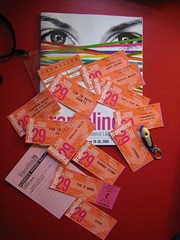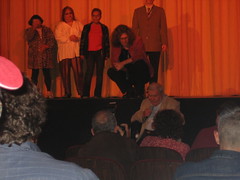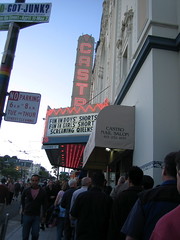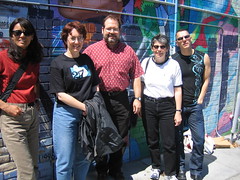Report From the Queer Cinematic Front
This year's pride celebration was the refuge of even our straight brethren. Heck if you don't like the direction the country is going you can always party with us and have a fabulous time. Our yearly retreat to the silver screen of the Castro Theatre, was particularly fruitful.
Transgender was in, I could see as I leafed through the festival schedule. In its 29th year the San Francisco gay film festival was quietly embracing the full spectrum of queer possibilities. With little fanfare the festival title had been changed from 'gay and lesbian' to The San Francisco International LGBT Film Festival. This was long overdue considering that it was ten years ago that the pride parade was renamed to include bisexual and transgender.
It is never easy to select which films. I was excited. How would gay filmmakers present our life in these difficult times? So spoiled were we by the increasing number of gay characters on HBO and two all queer sit coms of our own, would the film festival still transport us?
Judging from one of the showcased films, Happy Endings (soon to open at a theatre near you), gays and lesbians have earned a niche in middle class life. In this ensemble cast, the lesbians are attempting perfection in child raising and a gay couple (their best friends) are obsessed with the paternity of the child in case it turns out to be the product of one of their sperm donations. Harmless stuff of screwball comedy, but decidedly not gay. Not for me. This was a straight film with a straight lead character and gay people thrown in for a hip twist as they exemplify coupledom and child raising. Our talents are wasted here. Why compete in a straight paradigm?
More interesting was the world of a male to female transsexual just a week away from the surgery that would finalize her transformation. (One of the actresses from Desperate Housewives has the lead role, which is sure to evoke interest). Transamerica will open in mainstream theatres to deliver a story of the journey to self in the context of family relationships. Perfunctorily detailed, yet suspenseful and poignant, the audience is not asked to engage in the confusion of gender dysphoria, but in the character's determination to undergo the journey. Catherine and I were uplifted by the courage and nobility of this quest for integrity. This hero's journey was what being queer was about for us.
In Screaming Queens, Susan Stryker, a transgender historian brought us the little known tale of San Francisco's gay rebellion in the Tenderloin. A few years before drag queens fought back at the Stonewall bar in New York and launched the gay movement, there was a cafe in the Tenderloin called Compton's where the queens hung out. One night it was raided by police and a riot ensued. For the first time queers could see how powerful they could be as a group.
Their efforts were not recognized, explained the director, because there was no gay movement to recognize them. Only afterwards were gay groups beginning to form. During the Q & A at the screening, the now retired police officer she had interviewed came to the stage in his wheelchair. An audience member asked why he chose to speak up given the sentiments of his fellow officers. He spoke slowly and with effort. "As a member of my church, I just felt it was the right thing to do," he said. A startling revelation for these times and not one we expected.
The German coming of age story, Summer Storm, offered another gay journey with it's story of a teen hopelessly in love with his best friend and having to resolve their different paths. He does it without killing himself or suffering excessive trauma from his peer group. He even cracks a joke. A positive story of self-acceptance that includes a tender love scene worthy of any teen drama. Beautifully shot with high production values, it would be distributed in Europe by Warner Brothers, but in America only a little known distributor would pick it up, possibly not even for a theatrical release. When asked why, the director apologetically described the political climate in America today.
"I'm sorry, but this is what I see," he said, "As I traveled across the country I was very alarmed by the oppression by the religious right. This country used to be progressive, but not any more." Talk of the impact of the religious right on our lives makes me livid and I immediately want to buttonhole the nearest Christian and ask "how could you let this happen?" But we're not talking Christians here; we're talking about a group that more resembles the Klu Klux Klan without the scary outfits. We shouldn't need a German visitor to tell us this.
From Canada we were offered Eternal, a lesbian vampire movie to fulfill any hysterical homophobic right wing vision, but not nearly campy enough to be fun. My real objection to this Eyes Wide Shut, slick, horror flick was that it was cruel and heartless. The vampire was too eager to consume her victim in her greed for the blood that would give her eternal life. Why have eternal life for it's own sake? In my experience, the reward of the lesbian vampire - the initiator- is to facilitate the surrender of the 'victim' to forbidden pleasure. The lesbian vampire as change agent.
Forbidden pleasure is questioned in Tropical Malady, an unusual offering from my home country. Unlike any Thai movie I have ever seen, the film sets up a sweet love story then sends the lead character into the jungle by himself for the entire second half of the film. There he experiences what appears to be a complicated allegory for desire and is consumed by a tiger.
Europe, too, is far ahead of us in exploring sexuality as a bridge to more expansive thoughts. From post-Milosevic Serbia we got Take A Deep Breath, one of the few films we saw without a happy ending. When asked why not, the director explained that the relationships in the film were political metaphors for a fractured country and Serbia was a country hard put to find happiness. What a concept! What if someone made a relationship picture to express Bush's America? What a tale of deception, lies and betrayal that would be.
While the father was predictably homophobic in the Serbian film, what was refreshing was the reaction of the mother upon learning that her daughter is gay. She smiles with emerging delight and gives her blessing. "Nobody has found a recipe for happiness yet," she says. Meanwhile she herself is divorcing her philandering husband.
Men, it seems are offering a poor partnership in the middle years of many women's lives. In the British film Gypo, the husband is taciturn and brutish, endangering the life of a young immigrant woman who has offered his wife love and affection. This stripped down film complies with an unusual set of anti-Hollywood rules established by the Danish Dogme95 society. It is cinema verite at its strictest, with hand held cameras, and no additional lighting or music. The severity of these rules strip nearly all the atmosphere from the scenes, but it still manages to offer surprising narrative development.
In the Finnish film Producing Adults, a potential husband slips his girlfriend an RU40 pill to get rid of a baby she wants, but he doesn't. She is befriended by a woman doctor who may just prefer women given that her own boyfriend is a lay about slob. Here again a mother is ecstatically happy that her daughter brings home a woman rather than a man. It takes the better part of the movie to figure out if this film will actually have gay content, but it grows on me and the pay off is delicious. So deft is the invitation of the doctor, so sensuous the response.
It is the Spanish film Sauvigne that really takes a lesbian relationship to a new level of emotional exploration. The lesbian director of the film plays the lead herself. She has been at the Festival before with her prize-winning film Costa Brava and the theatre is packed.
In this story our endearing, self-deprecating, heroine vies for the attention of an actress turned director to produce her play. The director is intrigued and with the advice of her theatre critic husband, persuades our heroine to restructure the entire play in order to explore her own grief over the death of her daughter. The characters are rendered with such maturity and self-observation that it is entirely believable when the mix of creative collaboration, lesbianism and grief reaches an unusual catharsis. This to me, is what queer cinema is capable of.
For us the film festival was a return to our roots, to a psychic history that reminds us of our strengths, our transformative powers, our grit and resilient humor. Happy Pride.
Labels: Castro Theatre, film festival, LGBT, Queer








0 Comments:
Post a Comment
<< Home